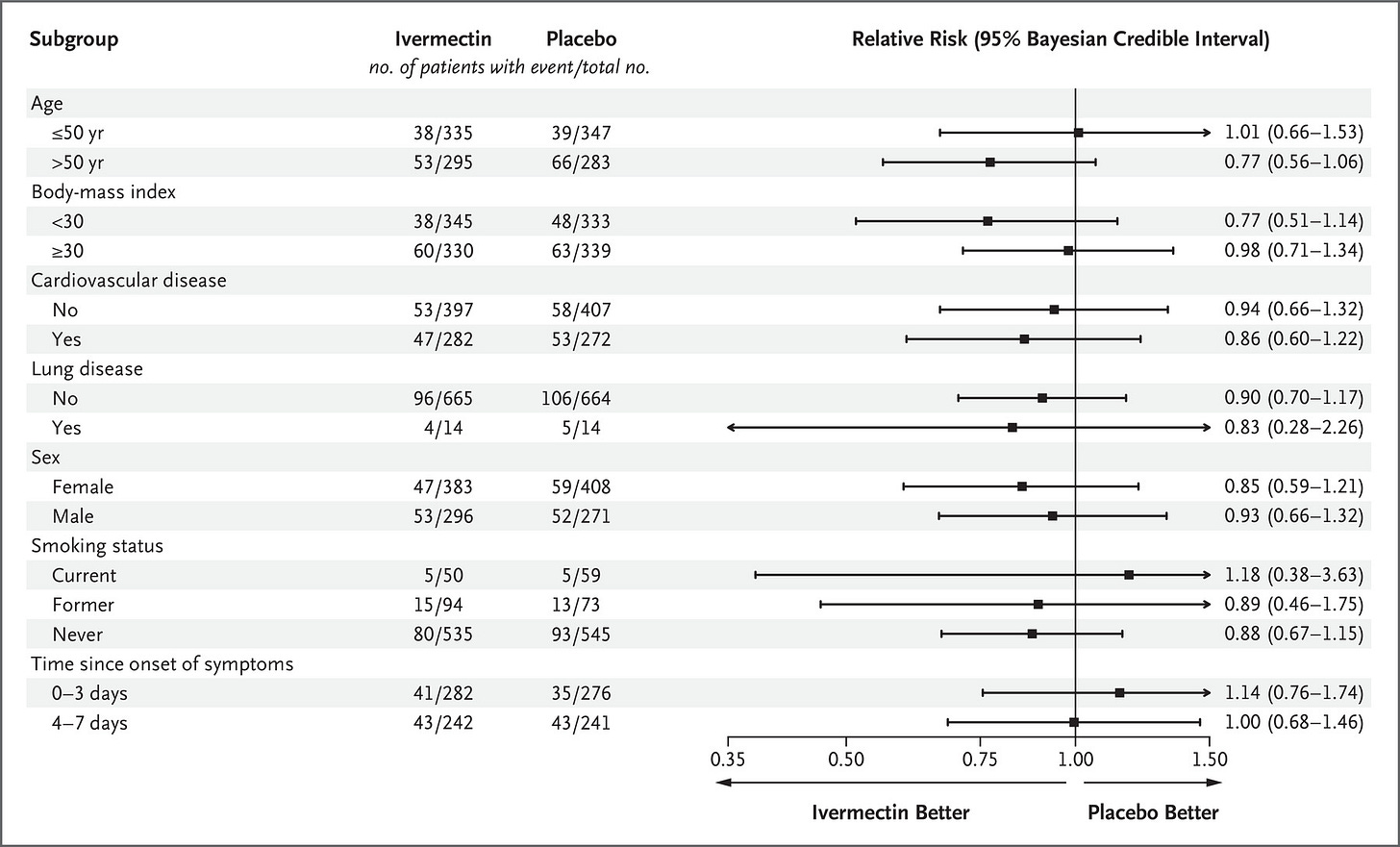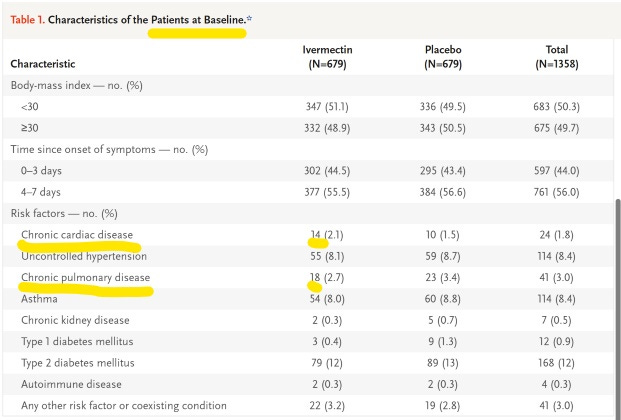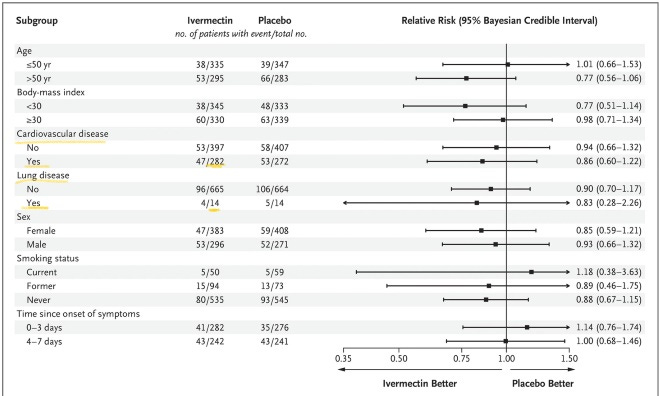Why This Ivermectin Study Must be RETRACTED, and How You Can Help
The latest “Ivermectin Doesn’t Work” study was published last week in The New England Journal of Medicine and is plagued with errors. I am demanding a retraction and could use your help.
Below is my letter to The New England Journal of Medicine (NEJM), demanding retraction of their March 30 study claiming that Ivermectin offers no benefit to Covid patients. The published study is riddled with errors, and the authors have not responded to requests for clarification.
Meanwhile, the question of whether drugs like Ivermectin and HCQ are effective early treatments for Covid has never been more urgent. The vaccines are failing, and Covid does not appear to be going away.
In fact, predictions that we may be on the brink of a mass die-off event, ala the Justinian Plague, are becoming increasingly more specific. See this latest interview with Dr. Geert Vanden Bossche for details:
https://www.youtube.com/watch?v=F530dxcB6_s
Vanden Bossche says the mass vaccination campaigns using non-sterilizing vaccines in the midst of a pandemic have encouraged the virus to select for not only increasingly contagious but also more virulent strains that are all vaccine-resistant. He believes the vaccinated in particular are now at serious risk of severe Covid and that the only hope for heavily vaccinated countries like the U.S. is large-scale prophylaxis with antivirals. He says his observations are all based on published, peer-reviewed epidemiological data.
You can help me bring honesty and transparency to published research on prophylactic and early treatment for Covid by sending your own email to NEJM, insisting that the editors either retract this study or offer logical explanations. Names and addresses are provided at the end of this letter.
April 9, 2022
Dear Dr. Rubin:
I publish an online newsletter called Kids, Covid, and Covid Vaccines.
I have reviewed the study, titled “Effect of Early Treatment with Ivermectin among Patients with Covid-19,” which was published in NEJM on March 30, 2022. I regret to inform you that I found numerous errors, contradictions and omissions that make this paper as currently written unacceptable for publication. I must therefore insist that you retract it immediately.
Already I see that NEJM “updated” the study on April 5 because another reader caught a glaring contradiction in the number of deaths reported in Table 3 versus Table S6.
The truth is that your editors did not “update” the paper, they corrected it so that the numbers would match. This should have been reported in your journal as a correction, not an update, along with an explanation as to why the numbers did not match in the original publication and how the editors determined which was the correct set of numbers. No such explanation was provided.
Unfortunately, this was not the only major error. The numbers in Figure 2 dramatically contradict the numbers published elsewhere in the study, with no explanation from the authors for this discrepancy.
For example, the authors report that the total number of patients enrolled in the Ivermectin group was 679. Yet, in Figure 2, the number of patients reported to be age 50 or under in the Ivermectin group is 335, and over 50 is 295, which adds up to 630. There is no explanation for what happened to the other 49 patients from the Ivermectin group in this analysis. In that same column, the total number of patients in the Ivermectin group with data reported for “Time Since Onset of Symptoms” is 524, far short of even the 630 reported in the age groups at the top of that same column.
In another example, the authors report in “Risk Factors” on Table 1 that 14 patients in the Ivermectin group suffered from “chronic cardiac disease” at baseline Yet, in Figure 2 a few pages later, the denominator (i.e. baseline) for the total number of patients in the Ivermectin group who suffered from “cardiovascular disease” is a whopping 282! While technically cardiac disease is a more narrow category than cardiovascular disease, Table 1 does not account for these additional 268 diseased patients anywhere else under “risk factors.”
The same problem occurs with pulmonary disease. The numbers from Table 1 do not match Figure 2. This is true for both the Ivermectin and control groups.
In fact, the entirety of Figure 2, in nearly every category, contradicts the numbers reported elsewhere, with no explanation as to why.
In addition to these very basic math problems, investigators stated clearly in the study protocol that patients who had been vaccinated against Covid-19 would be excluded.
Yet, in their published paper the authors devote a single throwaway line to the acknowledgment that they did, in fact, allow vaccinated patients into their study. Under the heading Patients they write: “Patients who had been vaccinated against SAR-CoV2 were eligible for participation in the trial.”
Patient vaccination status is then completely ignored in their analysis. No data are published as to how many patients in the Ivermectin and control groups were vaccinated. Nor is vaccination status reported relative to any patient outcomes. The authors treat Covid-19 vaccination as if it was expected to have no impact whatsoever on disease progression.
And yet, governments around the world have instructed their citizens that vaccination is by far the best way to protect themselves against Covid-19. Many people have lost their jobs for refusing to get vaccinated.
The failure to explain why the authors deviated from their published protocol, then neglected to report vaccination status relative to any outcomes, is not a minor oversight. It is a fatal flaw.
The most likely explanation for the authors’ decision to ignore this variable is that the patients in their study who were vaccinated actually suffered worse outcomes than the unvaccinated, whether they received Ivermectin or not. We have seen in many published datasets that the Covid-19 vaccines actually cause negative efficacy – meaning they increase the risk and severity of infection – for both the partially vaccinated on their way to being fully vaccinated (i.e. two weeks post Dose Two) and for the fully vaccinated once their antibodies begin to wane, usually within three months of vaccination. Hence, the current push in the U.S. for continuous booster shots.
If Ivermectin is less effective in the vaccinated, doctors and patients have the right to know. Regardless, hiding the vaccination status of the patients in this study for any reason is unethical.
I have written to Dr. Edward Mills, a principal investigator on the study, and to Dr. Gilmar Reis, who is listed as the lead author. Neither has bothered to respond to my requests for clarification on the numerous math discrepancies in their study. Nor have they answered my inquiry about the vaccination status of the trial participants.
Many other weaknesses of this study have been noted by those who have taken the time to review it, including inadequate dosing, failure to administer Zinc, failure to administer the drug early to all patients in the treatment group, failure to report the underlying illnesses of those who died, and failure to enroll enough patients to achieve statistically significant outcomes.
It is standard practice for authors to list both the strengths and weaknesses of their study. I find it ironic in the extreme that, with all these errors and omissions, yet another weakness of this study was the failure of the authors to acknowledge any weaknesses! No paragraph on the limitations of this study is included in the Discussion section.
Meanwhile, the study has generated a great deal of press. Patients may experience even more difficulty accessing this live-saving drug as a result of your journal’s decision to accept this deeply flawed study for publication. The study as written could not possibly have undergone peer review. Indeed, it appears that no one bothered to read it at all prior to publication.
Each day more people are waking up to the reality that life-and-death decisions about patient care no longer are predicated on sound medical science. Rather, they are being determined solely on the basis of their profitability for drug companies, pharmacies, and hospitals.
Unfortunately, most of the key players in this historic Covid debacle have been granted immunity by their governments for their daily acts of negligence that result in mass death.
Drug industry-sponsored medical journals like NEJM, by stark contrast, have no such immunity. Publishing and failing to retract studies like this one are sure to open up new avenues for patient compensation from the bodily harm caused by willful medical negligence and deliberate deceit.
Sincerely,
Darby Shaw
To help me get this study retracted, send email to the following:
Dr. Eric Rubin, MD, PhD, Editor-in-Chief
Dr. Mary Beth Hamel, MD, MPH, Executive Editor
The Together Trial
Dr. Edward Mills, Principal Investigator
Please spread the word. Share this post on your social media and directly with five people in your inner circle of family and friends. Thank you!





How are we supposed to convince the jabbed believers to take Ivermectin or HCQ should they become infected? My sister, for example, would never take anything other than perhaps Paxlovid, and was very critical when us unjabbed family members used Ivermectin to get us through our sars-cov-2 infections. That 30% will hold out, stubbornly, much to their own detriment.
Darby, this is a great find. I looked at that study with suspicion, but could not find anything. I am glad that you devoted it such a dogged attention.
Can't we ask for study data?